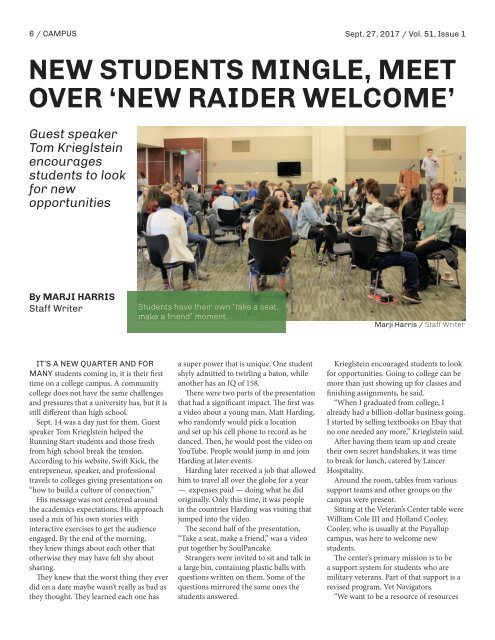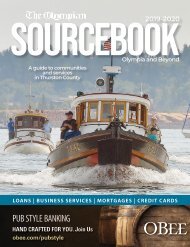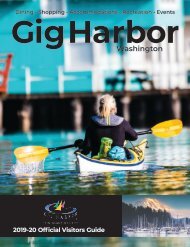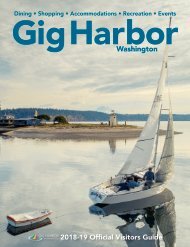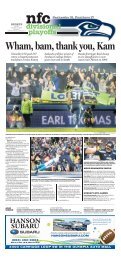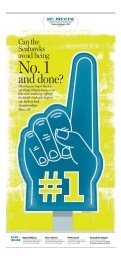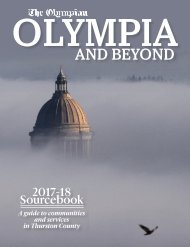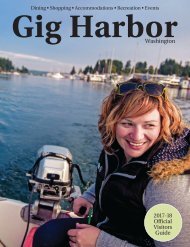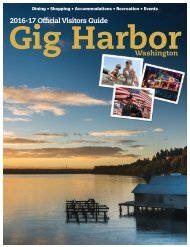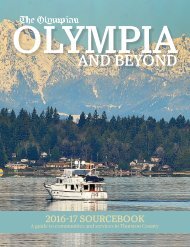Pierce College's The Pioneer - Vol. 51, Issue 1
You also want an ePaper? Increase the reach of your titles
YUMPU automatically turns print PDFs into web optimized ePapers that Google loves.
6 / CAMPUS<br />
Sept. 27, 2017 / <strong>Vol</strong>. <strong>51</strong>, <strong>Issue</strong> 1<br />
piercepioneernews.com CAMPUS / 7<br />
NEW STUDENTS MINGLE, MEET<br />
OVER ‘NEW RAIDER WELCOME’<br />
Guest speaker<br />
Tom Krieglstein<br />
encourages<br />
students to look<br />
for new<br />
opportunities<br />
By MARJI HARRIS<br />
Staff Writer<br />
IT’S A NEW QUARTER AND FOR<br />
MANY students coming in, it is their first<br />
time on a college campus. A community<br />
college does not have the same challenges<br />
and pressures that a university has, but it is<br />
still different than high school.<br />
Sept. 14 was a day just for them. Guest<br />
speaker Tom Krieglstein helped the<br />
Running Start students and those fresh<br />
from high school break the tension.<br />
According to his website, Swift Kick, the<br />
entrepreneur, speaker, and professional<br />
travels to colleges giving presentations on<br />
“how to build a culture of connection.”<br />
His message was not centered around<br />
the academics expectations. His approach<br />
used a mix of his own stories with<br />
interactive exercises to get the audience<br />
engaged. By the end of the morning,<br />
they knew things about each other that<br />
otherwise they may have felt shy about<br />
sharing.<br />
<strong>The</strong>y knew that the worst thing they ever<br />
did on a dare maybe wasn’t really as bad as<br />
they thought. <strong>The</strong>y learned each one has<br />
Students have their own “take a seat,<br />
make a friend” moment.<br />
a super power that is unique. One student<br />
shyly admitted to twirling a baton, while<br />
another has an IQ of 158.<br />
<strong>The</strong>re were two parts of the presentation<br />
that had a significant impact. <strong>The</strong> first was<br />
a video about a young man, Matt Harding,<br />
who randomly would pick a location<br />
and set up his cell phone to record as he<br />
danced. <strong>The</strong>n, he would post the video on<br />
YouTube. People would jump in and join<br />
Harding at later events.<br />
Harding later received a job that allowed<br />
him to travel all over the globe for a year<br />
— expenses paid — doing what he did<br />
originally. Only this time, it was people<br />
in the countries Harding was visiting that<br />
jumped into the video.<br />
<strong>The</strong> second half of the presentation,<br />
“Take a seat, make a friend,” was a video<br />
put together by SoulPancake.<br />
Strangers were invited to sit and talk in<br />
a large bin, containing plastic balls with<br />
questions written on them. Some of the<br />
questions mirrored the same ones the<br />
students answered.<br />
Marji Harris / Staff Writer<br />
Krieglstein encouraged students to look<br />
for opportunities. Going to college can be<br />
more than just showing up for classes and<br />
finishing assignments, he said.<br />
“When I graduated from college, I<br />
already had a billion-dollar business going.<br />
I started by selling textbooks on Ebay that<br />
no one needed any more,” Krieglstein said.<br />
After having them team up and create<br />
their own secret handshakes, it was time<br />
to break for lunch, catered by Lancer<br />
Hospitality.<br />
Around the room, tables from various<br />
support teams and other groups on the<br />
campus were present.<br />
Sitting at the Veteran’s Center table were<br />
William Cole III and Holland Cooley.<br />
Cooley, who is usually at the Puyallup<br />
campus, was here to welcome new<br />
students.<br />
<strong>The</strong> center’s primary mission is to be<br />
a support system for students who are<br />
military veterans. Part of that support is a<br />
revised program, Vet Navigators.<br />
“We want to be a resource of resources<br />
for veterans. Whether they need help<br />
with housing, mental health, anything<br />
for transitioning to civilian life,” Cooley<br />
said.<br />
“Having an actual presence on<br />
campus gives better communication<br />
between vets and staff,” Cole said.<br />
A new support group, ASPIRE, was<br />
also present. Miguel “Aki” Smith is the<br />
retention manager and Kiana Fuega is<br />
the outreach specialist.<br />
<strong>The</strong> organization’s goal is to serve and<br />
support students on campus who are of<br />
Asian and Pacific Islander heritage.<br />
“<strong>The</strong>se groups historically are<br />
underserved and we want to expose<br />
then fill gaps in services. Language<br />
is not the only barrier, Sometimes<br />
the barrier to a successful education<br />
can come through stereotypes. For<br />
example, often the perception is that<br />
Asian students do not need preparation<br />
or assistance when coming to school,”<br />
Smith said.<br />
“ASPIRE seeks to reach across<br />
those cultural barriers to successful<br />
academics,” Smith said. By assisting<br />
with goal-setting, personal growth, and<br />
development, they will reach, support,<br />
retain, and see their students graduate.<br />
At the WorkSource table, Jayna<br />
Petterson had pamphlets with<br />
information on the criminal justice<br />
program and the B-tech program.<br />
She enjoys events such as this because<br />
students can get a lot of information at<br />
once.<br />
Because she is also connected<br />
to WorkSource, she has funding<br />
connections. “Students can look<br />
here for additional, possible funding<br />
resources,” Petterson said.<br />
William Cole III, left, and<br />
Holland Cooley are ready<br />
to explain services and<br />
resources available for<br />
veterans.<br />
Tips for making the best start<br />
to a new school year<br />
BY BEATRIX CENDANA<br />
Contributing Writer<br />
Summer break is over. It is time to say hello to fall quarter<br />
and get in a school routine. Here are some tips on how to<br />
face that new reality:<br />
CHANGE YOUR SLEEP HABIT<br />
When on vacation, sleeping in or staying<br />
up late until midnight is the norm. But<br />
when attending college, it is not wise to<br />
continue that habit. Change this by:<br />
• Set an alarm two hours before<br />
you go to class so you will be ready to<br />
prepare for anything.<br />
• Keep away from any kinds of<br />
distractions (such as smartphone,<br />
laptop, or tablet) one hour before going<br />
to sleep.<br />
• Create calmness within yourself.<br />
Practice meditation or other<br />
mindfulness activities that relax the<br />
brain.<br />
LIST ALL PLANS<br />
List to-dos in notes or electronic devices<br />
to make sure assignments are finished for<br />
that day. Add other activities that could<br />
be joined after school, such as clubs or<br />
organizations. Also, make sure your<br />
notes are in your bag when you go out<br />
or make it as a reminder on your phone.<br />
EAT A HEALTHY BREAKFAST<br />
Protein, carbs and high fiber are<br />
needed to maintain your body. Start the<br />
day with a simple breakfast like wholegrain<br />
bread with honey or a boiled egg<br />
and a bowl of oatmeal. Breakfast helps<br />
your concentration for paying attention<br />
in class<br />
EXERCISE<br />
Walk for 30 minutes around the park<br />
or use the exercise facility on campus.<br />
Balancing movement with study helps<br />
the brain stay alert.<br />
Marji Harris / Staff Writer


